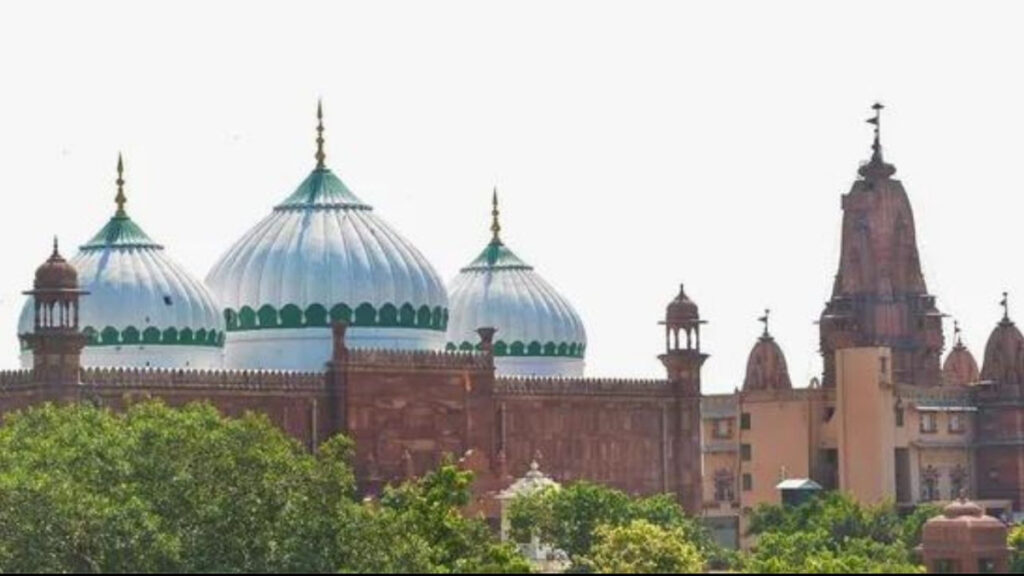By – Prakarsh Kastwar
The petition sought an archaeological assessment of Mathura’s Shahi Idgah Mosque as well as the designation of the site as Shree Krishna Janmabhoomi.
On Friday, the Supreme Court declined to hear a public interest litigation (PIL) that called for an archaeological study of Mathura’s Shahi Idgah Mosque and the designation of the location as Shree Krishna Janmabhoomi. The court reasoned that it was improper to have multiple lawsuits being heard at the same time as a number of civil suits pertaining to the same matter.
“Let’s avoid having numerous lawsuits. It was denied as you submitted it as a PIL. A panel of justices Sanjiv Khanna and Dipankar Datta stated, “File it as otherwise, the court will see,” noting that litigation in the matter were still ongoing before the Allahabad high court.
The lawyer representing the petitioner in the case said that the PIL was dismissed by the high court in October of last year because several suits on the matter were still pending. The Supreme Court ruled that hearing the case as a PIL was unconstitutional.
The counsel for petitioner Mahek Maheshwari added that the PIL also sought to challenge the constitutionality of the 1991 Places of Worship Act, which protects the “character” of all places of worship existing on August 15, 1947 (except the Ram Janmabhoomi land at Ayodhya) and prohibits the filing of any lawsuits to change the character of any place of worship.

The court said that the high court’s dismissing judgment left open the possibility of challenging the Act’s legitimacy. “We are unwilling to interfere with the impugned judgment, so the SLP [special leave petition] is dismissed.” “We clarify that the dismissal of the SLP makes no comment on the right of parties to challenge the viability of any enactment or prevents or bars any party from challenging the viability of any enactment,” the bench stated.
Maheshwari’s PIL claimed that the site in question was mentioned in several literature as Shree Krishna Janmabhoomi land. The plea further claimed that it was not a real mosque because Islamic law does not recognize a mosque built on forcibly obtained land, whereas Hindu law reveres a temple even if it is in ruins.
Masjids are not required in Islam, hence the Shahi Idgah Mosque should be demolished and the land, reportedly Krishna Janmabhoomi, turned over to Hindus, according to Maheshwari. He advocated for the formation of a proper trust for Krishna Janmabhoomi Janmasthan in order to construct a temple on the land.
The Supreme Court is currently hearing a slew of petitions related to the controversy.
The mosque management committee has appealed the Allahabad high court’s decision to transfer all petitions pending before Mathura civil courts to itself, as well as an order issued last month authorizing an advocate commissioner to conduct a study of the mosque premises.
The Supreme Court refused to halt the survey of the mosque next to the Krishna Janmabhoomi temple on December 15. It was observed that the Supreme Court has set January 9 to hear the committee’s and the UP Sunni Wakf Board’s arguments to the high court judgment opting to hear approximately 18 suits connected to the Krishna Janmasthan-Shahi Eidgah land dispute by shifting them to itself.
The mosque committee has claimed that it lacks the financial resources to defend the suits in the Allahabad high court, which is 600 kilometers distant, and would like to have it heard in Delhi, which is only 150 kilometers away.
The high court’s decision on May 26 was based on a petition filed by Bhagwan Shrikrishna Virajman at Katra Keshav Dev Khewat Mathura (deity) through his next friend, advocate Ranjana Agnihotri, and seven others. The next friend is a legal representation for someone who is unable to directly maintain a suit.
The petitioners sought that the original trial be held by the Supreme Court because the issue at hand is of national importance.
In their plea to the Supreme Court, the mosque committee questioned the legality of the suits after a lengthy delay. The complaint, it claimed, is forbidden by the Places of Worship (Special Provisions) Act.
On July 21, the Supreme Court stated that it would be in the best interests of all parties if the issue was resolved “as soon as possible,” because pending proceedings in such “sensitive” matters generate “disquiet.”
The court instructed the high court registrar to give data of all such outstanding cases, adding that it will lay down rules for considering the slew of claims relating to the dispute. It stated that given the complexities of the issue, it would be more suitable for a high court judge to apply his thinking.
Multiple lawsuits ongoing in Mathura courts involving the Krishna Janmabhoomi-Shahi Eidgah Mosque property dispute all call for the 13.37-acre plot of land on which the mosque stands to be returned to the Shri Krishna Janmabhoomi Trust. The mosque is very next to the temple. The lawsuit sought to overturn a 1968 agreement reached between the mosque committee and Shri Krishna Janmasthan Seva Sangh that allowed the status quo.

